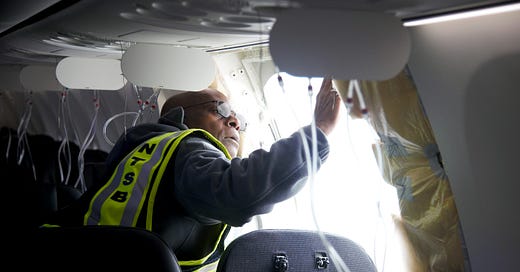Boeing's Door Disaster in Perspective
Keeping perspective might prevent disaster from "striking twice"
Earlier this month, as you have likely heard, a door blew off of a Boeing 737 Max 9 in midair. Fortunately, while one teenager’s shirt was sucked off, nobody suffered serious injuries. Airlines have been inspecting the doors on their 737 Max 9 aircraft, and they’re reportedly finding issues with bolts that keep the doors in place.
Late one night last week, I had some time to ponder this while sitting on a Boeing plane that was having a technical malfunction on the ground. After two hours or so, the problem was fixed. We finally pushed back from the gate, and made it about ten meters before the pushback tug malfunctioned, and we were stuck. That was the end of that plane for the night. Sitting there annoyed about maintenance issues, I decided to find some commiseration in online comments about the Boeing 737 Max 9.
I knew there would be plenty of snark, as well as reasonable aggravation, but I was (only slightly) surprised to see hordes of comments pointing out how dangerous commercial airlines are. This included many commenters sharing some version of: “That’s why I’ll only drive from X to Y even though it takes longer.”
Seeing that comment, repeatedly, reminded me of a paper I read about a decade ago by psychologists Wolfgang Gaissmaier and Gerd Gigerenzer.
The pair was evaluating what Gigerenzer called the dread hypothesis, the idea that because people fear high-profile low-probability events, they will end up embracing behavior that is lower profile but actually higher risk. In the specific paper I read, Gaissmaier and Gigerenzer found that Americans flew less and drove more in the year after 9/11, which led to 1,600 more traffic deaths over that period than would otherwise have been expected.
In the months after 9/11, driving increased most in areas close to New York City, and on interstate highways. The pair of psychologists pointed out that there was a particularly noticeable increase in traffic deaths for drivers who were outside their home state, suggesting that people were probably replacing flights with long drives right after 9/11.
Driving is much more dangerous than commercial flying.1 Thus, Gaissmaier and Gigerenzer wrote: “Terrorists can strike twice—first, by directly killing people, and second, through dangerous behaviors induced by fear in people’s minds.”
Despite the errant Boeing door (and despite my grumbling on a malfunctioning plane last week), I remain astounded by the safety record of commercial aviation. In 2022, out of 32 million flights worldwide, there were five with fatalities. Most of the 158 deaths that year occurred on a single flight. And commercial air travel has been getting safer over time. (In the U.S., driving had been getting steadily safer since the 1970s, although that trend reversed a bit in the last few years.)
How exactly you quantify the risk of flying versus driving depends on how you choose to measure — by distance, by passenger boardings, etc. But no matter the choice of metric, driving is vastly more dangerous than flying. (“But I’m at lower risk because I’m a better driver than most people,” you say. A classic study found that pretty much everybody thinks they’re a better driver than most people, which obviously isn’t possible.)2
I was in Manhattan on 9/11; I certainly don’t mean to downplay the understandable fear in the aftermath of that tragedy. And I think it makes sense to have a ton of scrutiny on Boeing right now. But I also think bringing context to scary headlines can help us make sure that rare and frightening events don’t “strike twice,” so to speak.
If you’re suddenly interested in aircraft maintenance, there’s a short but fascinating section on it in chapter three of psychologist Adam Alter’s book, Anatomy of a Breakthrough. Alter writes about the four different levels of checks that commercial planes undergo, from level A (basic checks every two days that ground the plane for a few hours) to level D (heavy maintenance every six to ten years that grounds the plane for two months).
Here’s the Q&A I did with Adam. (We don’t touch on aircraft maintenance.)
Thanks for reading. If you enjoyed this post, please share it.
And if someone sent this to you, perhaps while you’re sitting on a tarmac, you can subscribe here:
Until next time…
David
In his book Risk Savvy, which I thoroughly enjoyed, Gigerenzer notes that between 2002 and 2005, 2.5 billion passengers flew on U.S. commercial flights, and “not a single one died in a major airline crash.” (As reader Donald Kiesling pointed out, though, there was an American Airlines crash shortly after 9/11 — in November of 2001 — that killed everyone aboard.)
I like to check for follow-ups on old studies, and even though I only did that in a cursory manner for this study, I found something worth sharing. Specifically, more recent research on driver-overconfidence has found that it may not be the case that everyone just straightforwardly thinks they’re better than everyone else. (Although Range Widely readers are better than everyone else.) Rather, people seem to apply their own idiosyncratic definition of what “better” means, according to what they care about, while recognizing others may apply different criteria. So if we’re all applying different definitions, we may in fact all be better drivers than everyone else. Congrats us! Here’s a relevant study, and here’s a succinct post by a researcher.







This Boeing news came at the unfortunate moment when I am facing some upcoming airplane travel, and I 100% had the "dread hypothesis" conversation with Caleb last week. Thank you for helping me name the fear, face it with a wiser perspective, and overcome it!
David, I had a recent conversation with our local superintendent of schools, who bemoaned the fact that so many parents drive their kids to school even though they live within easy walking/biking distance. They remember hearing about the kidnapping and murder of a young boy on his way home from school 50 years ago.
Recent research seems to indicate that as it becomes increasingly rare for kids to engage in activities without adult supervision, it may be contributing to an increase in mental health difficulties:
'All work, no independent play' cause of children's declining mental health
https://www.sciencedaily.com/releases/2023/03/230309101330.htm
I recently argued with my wife about what age is appropriate for kids to go trick-or-treating on Halloween alone. I thought maybe 12-13, but she insisted that was too dangerous, especially for girls. Of course, in our town of 15,000, there's never been an instance of an abduction of a child going back to its founding in 1850.